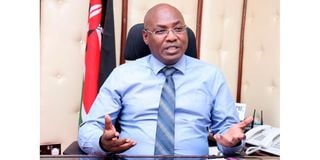Four million 'hustlers' at risk of losing health cover after Sh6bn budget cut

Principal Secretary Harry Kimtai.
The Ministry of Health has budgeted Sh20 billion for luxuries, including lavish travel allowances, but its officials won't spare Sh6 billion for nearly four million poor hustlers who are without state-funded medical cover.
The ministry, which was indicted by auditors for failing to account for Sh14,157,676,754, is now blaming the collapse of the Finance Bill as an excuse for not renewing the cover for the poor.
Medical Services Principal Secretary Harry Kimtai told the National Assembly's Health Committee this week that Sh6 billion had been allocated for indigent health care in the 2023/2024 financial year, but now the budget allocation for the 2024/2025 financial year has been reduced to zero.
“This contradicts the government's agenda to make healthcare accessible to all, regardless of social or economic background. Therefore, the state department is requesting the reinstatement of Sh6 billion for this critical national project,” Kimtai told MPs.
Those affected, Kimtai said, are one million households, or four million Kenyans.
However, according to the latest Auditor-General's report, the Ministry of Health recently paid some unknown 'employees' Sh14,157,676,754 outside the Integrated Personnel and Payroll Database (IPPD) system after an actual expenditure of Sh30,593,615,201 against a Treasury-approved budget of Sh41,986,549,723.
“It includes Sh766,458,883 that was paid outside the IPPD system, management confirmed this to be payments made to the Agence Française de Development (AFD) project, Cuban doctors and malaria vector specialists processed outside the system. This is contrary to the National Treasury directive that requires personnel emoluments to be processed and paid through IPPD,” the auditor-general report notes, highlighting that in the circumstances, the existence of effective mechanisms on the payroll could not be confirmed.
Appearing before the committee, Kimtai also said that the Ministry of Health also needed Sh100 million for sensitisation and public participation on the Social Health Insurance Act (SHIA), which was recently declared unconstitutional by the High Court.
Kimtai explained that in the past, the State Department of Medical Services had paid health insurance premiums for one million households, covering four million people who could not afford health care.
“The Primary Health Care Fund is fully government-supported but limits access to services to dispensaries and health centres, with more advanced medical treatments available only upon referral from these facilities,” said Kimtai.
“Access to services at this level requires full payment. Failure to fund the indigents' insurance goes against the spirit of universal healthcare coverage, where equity is a main component,” he added, noting that this would limit access to essential hospital services.
Chairman of the committee, Dr Robert Pukose (Endebess), urged the state department to accept the budget cuts, adding that they were due to the withdrawal of the 2024 Finance Bill, which was expected to raise Sh344 billion but was rejected by Kenyans.
“Due to this, we must rationalise the budget, resulting in a shortfall of approximately Sh121 billion. This means the government will have to borrow over Sh220 billion to cover the deficit,” Pukose said.
Pukose also urged public and state officials, especially heads of parastatals, to be deliberate in their services to the public and the government.
“Many officials may be idle, just watching television to see what is happening within this region. The budget cuts affect everyone, not just the president and members of parliament. It impacts your ability to deliver services to the people of Kenya,” he said.
On July 12, 2024, the High Court nullified the Social Health Insurance Act 2023, the Primary Healthcare Act 2023 and the Digital Health Act 2023, which replaced the National Health Insurance Fund (NHIF), for lack of public participation.
A three-member bench of Justices Alfred Mabeya, Robert Limo and Fredrick Mugambi gave Parliament 120 days to make the necessary amendments.
During this period, the laws will remain suspended, they ruled.
However, the court suspended its own ruling for 45 days.
Kimtai told the health committee that the ministry had reviewed the court's ruling and believed there were sufficient grounds to appeal some of the directives issued.
In its ruling, the three-judge bench said that sections 26(5) and 27(4) of the Act did not pass constitutional scrutiny because they made no exceptions for the right to emergency medical services, thus violating Article 43 of the Constitution, which guarantees every Kenyan the right to health services.





